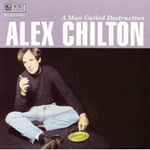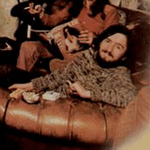|
 |
| Unreleased Led Zeppelin recording discovered at car boot sale |
A previously undiscovered bootleg of a 1971 Led Zeppelin gig has been unearthed at a car boot sale.
The gig, from the band's 1971 show at St Matthew's Baths Hall in Ipswich features tracks including 'Immigrant Song', 'Whole Lotta Love', 'Stairway To Heaven', 'Rock & Roll', and 'Black Dog'.
Bargain hunter Vic Kemp bought the CD bootleg at a car boot sale in Portman Road, Suffolk, and told the Evening Star that he picked it up for just "two or three pounds".
He explained: "I was going through a stand of CDs at the car boot at Portman Road and the guy who was selling them said, "you might be interested in this"."
Kemp continued by saying that the gig "must have been recorded by someone standing at the front with a microphone. You can hear Robert Plant talking to the audience quite clearly."
It's currently unclear whether any duplicate recordings of the tape have been made.
Source UNCUT |
|
 |

|
| KISS to develop kids TV show |
by JOE BOSSO |
You've got your KISS ketchup, action figures, toothbrushes, underwear, air fresheners, condoms, credit cards. And perhaps you've already purchased a KISS Kasket. But if you were hoping to sit back with your little ones and watch a KISS TV show the whole family can enjoy, well, you're in luck, because that's just what's being planned.
Honestly, the idea of a children's show that features a bass player dressed up in leather who spits fire and sticks out his blood-covered tongue might strike some as, uh, strange, but founding KISS members Gene Simmons and Paul Stanley think it's the logical next step for a new generation of KISS Army inductees.
The untitled comedy series will be produced and distributed worldwide by E1, which along with Simmons and Stanley will handle all licensing and merchandising for the half hour.
KISS is a "brand"
"Kiss continues to be the juggernaut of licensing and merchandising, from Kiss M&M's to Kiss Dr Pepper," Simmons said in a statement. "Kiss is a band, but also the only music brand. Continuing in our 35 year history of going where no band has gone before, we are proud to partner with E1. Like all things KISS, we intend to make this a very special show for our fans."
No word was given what roles original members Ace Frehley and Peter Criss would have in the show, but we imagine their likenesses will be used in some fashion.
Source musicradar |
|
 |
 |
| New York Dolls announce one-off London show |
The New York Dolls have announced details of a one-off London show at KOKO on April 19.
The gig will be in support of their 2009 album 'Cause I Sez So', produced by Todd Rundgren, who also helmed their 1973 self-titled debut album.
The band, who reformed in 2004, now consists of just two original members – singer David Johansen and guitarist Sylvain Sylvain – following the death of bassist Arthur 'Killer' Kane in 2004.
To check the availability of New York Dolls tickets and get all the latest listings, go to NME.COM/TICKETS now, or call 0871 230 1094.
Source NME |
|
 |
 |
| Alex Chilton 1950-2010 |
by MARTIN ASTON |
ALEXANDER CHILTON, FRONTMAN of soul-pop ingénues The Box Tops, co-founder of Anglophile Dixie guitar legends Big Star and latterday solo artist, unexpectedly passed away yesterday after suffering a heart attack in New Orleans, aged just 59.
The first time we met, in spring 1986, was in London's grimy Harlesden, a fair distance from his birthplace in Memphis, Tennessee. Born on December 28, 1950, the 36-year old Alex was aquiline, with darting, twinkly eyes and a mischievous grin, eating yoghurt, sipping water and fielding my unsophisticated questions. I was barely two years into writing about music, and Chilton was a stone-cold hero, responsible for epochal Big Star albums #1 Record, Radio City and Third/Sister Lovers, someone I'd expected to die young after living fast. But having perfected the art of falling apart, he had returned, addictions banished and health seemingly resuscitated.
Spiritually too, he'd come a ways from the hellraising era he labelled his "lost decade": the '70s. Big Star had been cursed by label/distribution shenanigans, fights, breakdowns, drug/drink abuse and co-founder Chris Bell's premature death in a car crash. Massively underappreciated, they'd been too late for Merseybeat and too early for the new wave. But punk (check the venomous energy of Don't Lie To Me off #1 Record) and goth (Third/Sister Lovers' morose, claustrophobic ballads) learned from Chilton, and later bands - from The Bangles to The Replacements to Teenage Fanclub - were quick to sing his praises. "People say they're arguably some of the best rock'n'roll albums ever," Alex told me. "I say they're wrong."
Fleeing his native South, he'd headed to New York to find himself, pie-eyed on downers and alcohol amid broken relationships. The result was 1978's suitably lurching solo debut Like Flies On Sherbert. "I was getting very destructive in lots of ways then," he told me, "and I was trying to capture that on the recordings."
But by 1986, he'd been drug-free for eight years and drink-free for four. Having moved to New Orleans to start all over again, he was back gigging to support his first studio record in eight years: the R&B/country-brewed Feudalist Tarts. He'd play occasional Big Star tracks but his subsequent solo canon upheld the rootsy theme, his love of Ray Charles and Ernest Tubbs.
"A certain mindlessness is essential," Chilton told me. "Rock'n'roll is meant to shoot from the hip. I once produced a Detroit band, The Gories, I Know You Fine But How You Doin' album [Chilton also produced the first Cramps album, 1980's Songs The Lord Taught Us]. There's this track, I Think I've Had It, which goes, "I put up with all that stuff for all your love / I really dig you but I just can't take it no more / I've had it, I'm headed for that door" - there's just something mindless and callous about it, which I love."
I interviewed Chilton twice again, the second time when Rhino officially launched the Big Star revival in 1992 via the full Third/Sisters Lovers collection, a live Big Star session and Bell's 'lost' solo recordings. At which point, Chilton - misfit, mystery, contrary sod - clammed up and barely mentioned the band again. Which is why Big Star's reformation a year later, with Chilton, loyal drummer Jody Stephens and Posies guitarist Jonathan Auer and bassist Ken Stringfellow, was as shocking as it was delicious.
Chilton was a laconic presence at subsequent Big Star reunions, and you knew he was only in it for the money, but it introduced a new audience to a great band (even if Alex didn't agree). Now he joins Chris Bell and Third/Sister Lovers producer Jim Dickinson, who died last year at the Big Star recording session in the sky.
I know you won't like it, Alex, but those Big Star albums remain among my all-time favourites. Sorry I had to have the last word.
Source MOJO |
|
 |

|
| Farewell, Charlie Gillett |
THE MUSIC WRITER and broadcaster Charlie Gillett, who died on March 17, aged 68, had spent 40 years introducing new music to an appreciative audience. In the 1960s, it was American soul; in the 1970s, he provided the first radio exposure for the cream of the new wave as well as one of the biggest bands of all time; for the past 25 years, he had been world music's most enthusiastic evangelist. Above all, however, he was a fan of good music.
Living far from London and unable to hear his Honky Tonk radio show in the 1970s, I initially came across Charlie in the 1980s, when his 1970 book The Sound Of The City was required reading for anybody trying to understand the heritage of rock music. MOJO contributor Richie Unterberger called it "the first serious and comprehensive history of rock'n'roll", but I didn't appreciate its significance at the time; I was busy spluttering over the idea that anybody could claim Buddy Holly was past it by 1958. One day, I thought, I'd like to argue that out with this guy.
A decade later, London's Time Out magazine approached him to become their world music correspondent. He turned them down, replying that they'd already found somebody who could do the job. And so began my writing career. While hanging around the office, I'd previewed some gigs, but I had never thought about giving up my life as a van driver and becoming a music journalist.
A few weeks later, I met him for the first time and he quickly explained the gig he'd just put me down for. Anybody can list facts, but you can't convincingly fake enthusiasm. Say what you believe about what you like - and in Charlie's case that included his "discoveries" Ian Dury, Elvis Costello, Lene Lovich and Dire Straits - and you will persuade others they should be interested; recite facts and you'll turn them off. It's good to have erudition to back your argument up (and The Sound Of The City was Charlie's Master's thesis in expanded form), but it's the love that counts.
We were both soul fans who had stumbled into a whole new sphere of music and knew we could never convince ourselves that we were experts, but that wasn't going to stop us trying persuade others to join in our journey into the unknown. On his radio shows, Charlie held our hands as he opened a new CD and wondered aloud what Youssou N'Dour, Mariza or Salif Keita would sound like. We knew he already knew, and we knew he wouldn't play it if he didn't like it.
Charlie would sneak up on you in gigs and open conversations with something like, "Have you heard Sekouba Bambino's version of It's A Man's Man's Man's World? I think you'd like it." He'd argue that concerts were inferior to recordings, because the artist would put so much thought into seven inches of vinyl that the single had to be the definitive statement. He'd rail against iPod culture because when he was in Memphis or New Orleans or Bamako, he wanted to hear the city, not be shut off from it. And he'd end the conversation by telling you of another tune you had to hear.
I know I'm not alone in owing Charlie a lot more than my musical education. As a writer, producer, label-owner and warm voice in the darkness, he nurtured likeminded souls and encouraged them to have a go at doing his job. In an era sterilised by professionals and experts, his peerless amateur enthusiasm stood out as a beacon. Thanks for the music, Charlie - now you can take your Buddy Holly theory up with the man himself.
David Hutcheon is MOJO's world music correspondent
Source MOJO |
|
 |

|
| Micky Jones R.I.P. |
by PHIL ALEXANDER |
Man guitarist Micky Jones passed away peacefully on March 10, 2010, following a long illness that had forced him to retire from the legendary Welsh band with whom he'd played since their inception in 1968.
Born in Merthyr Tydfil on June 7, 1946, Jones formed his first band The Rebels in 1960 before turning professional three years later as a member of local heroes The Bystanders. The latter group's harmony-led approach would help define Man's own sound when they formed in 1968.
Hugely influenced by the West Coast scene, Man's melodic suss was welded to Jones's distinctive and dextrous guitar runs, themselves inspired by the Grateful Dead and John Cipollina from Quicksilver Messenger Service. Indeed, the latter would join man in 1974 and forge a firm friendship with Jones.
Man released their debut album, Revelation on Pye in 1969 before moving to the label's progressive rock offshoot Dawn for their second set, 2 Ozs Of Plastic With A Hole In The Middle, the latter featuring the classic Spunk Box.
A deal with United Artists followed in 1970 and it was then that Man truly came into their own, releasing their self-titled third album the following year - characterised by Jones's sparkling post-boogie fretwork on the likes Daughter Of The Fireplace. The follow-up, Do You Like It Here Now, Are You Settling In?, emerged swiftly in November 1971, tracks like Angle Easy proving that Man had hit a rich vein of form.
By 1972 Man were firmly part of Britain's burgeoning post-psychedelic freak-rock scene, often sharing the bill with the likes of Hawkwind, Gong, Brinsley Schwarz, Soft Machine and the Pink Fairies. While their reputation grew abroad, they also became regulars at London's Roundhouse, then home to the UK's underground, a scene celebrated on the seminal Greasy Truckers Party album.
Live, the Man band came to be defined by the contrast between the sweeter, more melodic sound Jones preferred and the more aggressive, biting tone of Deke Leonard's playing, driven by the imperturbable pulse of Terry Williams' drums. Micky's solos, lengthy on record, would unfurl in organic splendour on-stage as he lost himself in the moment of extemporisation. C'mon, Bananas, Spunk Rock, Romain, Many Are Called But Few Get Up were expanded to 19-, 20-, 21-minute pieces of prime Welsh rock. They were also a hugely good company, with Micky the drily humorous and genuinely gentle man who still knew his own mind, and would bridle if there were any suggestion that Man's sound or direction was being overly influenced by, say, Deke Leonard or keyboardist Phil Ryan.
Despite their increasing success, Man's own attitude was one of resolute anti-stardom. While the band's personnel changed incessantly during the rest of the '70s, Jones remained the sole constant but never emerged to assume leadership of the band despite such studio triumphs as 1973's Back Into The Future and Rhinos, Winos + Lunatics (the latter produced by Roy Thomas Baker).
The band's initial split in '76 did not stop Jones from playing, the guitarist contributing to a number of post-Man groups including a reformed incarnation of mod cult heroes The Attack in '79, The Flying Pigs, The Mary Whitehouse Experience and The Penetrators with fellow ex-Man men Tweke Lewis and Will Youatt. Man themselves re-emerged in the '80s and continue to gig to this day.
Jones was forced to abandon playing with Man in 2005 having been diagnosed with a brain tumour three years earlier. In a typically family-orientated fashion, he ceded his place to his son George who assumed six-string duties within the band.
An understated talent, Micky leaves a legacy of fine music and indelible memories for a generation of British rock fans. MOJO would like to extend our condolences to the Jones and Man families...
Source MOJO |
|
 |
|
|
|
|
|



